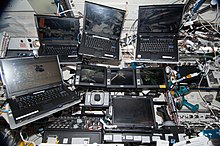Laptop disposal

The list of materials that go into a laptop computer is long, and many of the substances used, such as beryllium, lead, chromium, and mercury compounds, are toxic or carcinogenic to humans. Although these toxins are relatively harmless when the laptop is in use, concerns that discarded laptops cause a serious health risk and toxic environment damage, were so strong, that the Waste Electrical and Electronic Equipment Directive (WEEE Directive) in Europe specified that all laptop computers must be recycled by law. Similarly, the U.S. Environmental Protection Agency (EPA) has outlawed landfill dumping or the incinerating of discarded laptop computers.
Most laptop computers begin the recycling process with a method known as Demanufacturing, this involves the physical separation of the components of the laptop. These components are then either grouped into materials (e.g. plastic, metal and glass) for recycling or more complex items that require more advanced materials separation (e.g.) circuit boards, hard drives and batteries.
Corporate laptop recycling can require an additional process known as data destruction. The data destruction process ensures that all information or data that has been stored on a laptops hard drive can never be retrieved again. Below is an overview of some of the data protection and environmental laws and regulations applicable for laptop recycling data destruction:
- Data Protection Act 1998 (DPA)
- EU Privacy Directive (Due 2016)
- Financial Conduct Authority
- Sarbanes-Oxley Act
- PCI-DSS Data Security Standard
- Waste, Electronic & Electrical Equipment Directive (WEEE)
- Basel Convention
- Bank Secrecy Act (BSA)
- FACTA Sarbanes-Oxley Act
- FDA Security Regulations (21 C.F.R. part 11)
- Gramm-Leach-Bliley Act (GLBA)
- HIPAA (Health Insurance Portability and Accountability Act)
- NIST SP 800-53
- Add NIST SP 800-171
- Identity Theft and Assumption Deterrence Act
- Patriot Act of 2002
- PCI Data Security Standard
- US Safe Harbor Provisions
- Various state laws
- JFAN 6/3
- Gramm-leach-Bliley Act
- DCID
Comments
Post a Comment